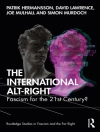Central Peripheries explores post-Soviet Central Asia through the prism of nation-building. Although relative latecomers on the international scene, the Central Asian states see themselves as globalized, and yet in spite of – or perhaps precisely because of – this, they hold a very classical vision of the nation-state, rejecting the abolition of boundaries and the theory of the ‘death of the nation’. Their unabashed celebration of very classical nationhoods built on post-modern premises challenges the Western view of nationalism as a dying ideology that ought to have been transcended by post-national cosmopolitanism.
Marlene Laruelle looks at how states in the region have been navigating the construction of a nation in a post-imperial context where Russia remains the dominant power and cultural reference. She takes into consideration the ways in which the Soviet past has influenced the construction of national storylines, as well as the diversity of each state’s narratives and use of symbolic politics. Exploring state discourses, academic narratives and different forms of popular nationalist storytelling allows Laruelle to depict the complex construction of the national pantheon in the three decades since independence. The second half of the book focuses on Kazakhstan as the most hybrid national construction and a unique case study of nationhood in Eurasia.
Based on the principle that only multidisciplinarity can help us to untangle the puzzle of nationhood, Central Peripheries uses mixed methods, combining political science, intellectual history, sociology and cultural anthropology. It is inspired by two decades of fieldwork in the region and a deep knowledge of the region’s academia and political environment.
Praise for Central Peripheries
‘The presentation of the history of official narrative-formation and the debate around it as well as the challenges posed by the realities of today’s society is fascinating reading.’
Slavic Review
‘Laruelle, a prolific expert on post-Soviet Central Asia, compiles ten updated essays on nationalist ideologies in the post-Soviet era.’
Foreign Affairs
‘The author’s research is highly commendable as it highlights the promotion of national languages as part of the nation-building process.’
Europe-Asia Studies
‘An important addition to a fairly small body of work on this region of the world. … Essential material to understand the current period in Central Asia.’ Nationalism and Ethnic Politics
‘A much-anticipated book, which is going to become the go-to resource for every reader interested in nationalism in Central Asia.’ New Books Network
‘There is no other book that delves so deeply into the complex issue of Central Asia nation-building. Laruelle offers comprehensive empirical evidence to highlight similarities and differences in the processes whereby the leaderships of four Central Asian states attempted to build their nationhood after the Soviet collapse.’ Luca Anceschi, University of Glasgow
‘Using the concept of hybridity, Laruelle explores the multitude of historical, political and geopolitical factors that predetermine different ways of looking at nations and various configurations of nation-building in post-Soviet Central Asia. Those manifold contexts present a general picture of the transformation that the former southern periphery of the USSR has been going through in the past decades.’ Sergey Abashin, European University at St Petersburg
‘Marlene Laruelle paves the way to the more focused and necessary outlook on Central Asia, a region that is not a periphery but a central space for emerging conceptual debates and complexities. Above all, the book is a product of Laruelle’s trademark excellence in balancing empirical depth with vigorous theoretical advancements.’
Diana T. Kudaibergenova, University of Cambridge
‘The presentation of the history of official narrative-formation and the debate around it as well as the challenges posed by the realities of today’s society is fascinating reading’
Slavic Review
Table of Content
List of figures
Preface
Introduction: Central peripheries
Part 1. Writing the national biography
1 The longue durée of national storytelling: Soviet roots and the quest for ethnogenesis
2 Centrality and autochthonism: Uzbekistan’s nationhood
3 Aryan mythology and ethnicism: Tajikistan’s nationhood
4 National unity versus pluralism: Kyrgyzstan’s nationhood
5 Reborn nation, born-again religion? The case of Tengrism
Part 2. Politics and the Nazarbayev order
6 Hybridity in nation-building: the case of Kazakhstan
7 Ideology of the ‘crossroads’: Eurasianism from Suleimenov to Nazarbayev
8 Media and the nation: searching for Kazakhness in televisual production
9 Language and ethnicity: the landscape of Kazakh nationalism
10 Generational changes: the Nazarbayev Generation
Conclusion: The missing pieces of Central Asia’s nationhood puzzle
References
Index
About the author
Marlene Laruelle is Director and Research Professor at the Institute for European, Russian and Eurasian Studies (IERES), Elliott School of International Affairs, The George Washington University. Dr Laruelle is also Director of GW’s Central Asia Program. She received her Ph.D. in history at the National Institute of Oriental Languages and Cultures (INALCO) and her post-doctoral degree in political science at Sciences-Po in Paris. She has published widely on ideology, nationalism, and identity and their impact on domestic and foreign policies in the post-Soviet space.












